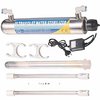Hello! I saw on this website an old forum topic - like 15 years ago, where some ppl by and large were discussing how this technology works. What bothers me as a potential consumer , considering buying a home system for drinking water - is it totally safe? I trust that it kills all organic impurities as stated, but what about radiation? Even sun UV which must be weaker - since it doesn't kill bacteria etc. in ponds e. g. is said to be dangerous for skin and eye exposure, this is what causes sunburn and when stronger - as in such a device - clears germs by destroying their DNA. Then what about the water we drink - if it has been irradiated, won't it carry that same radiation when we devour it and can't it damage consumers' DNA as well? Else, if water does not absorb radiation, then where does it go? Once it has been produced, it can't just disappear, I guess it shall saturate the closest surrounding objects - the water pitcher walls, the kitchen cabinets and countertop - and emit from them?
-
Categories
-
Platforms
-
Content

